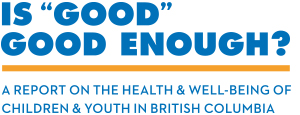Grade 10 Math
Indicator #50: Grade 10 Math
Indicator 50: Percentage of BC students in grade 10 who pass (receive a grade of C- or better) the grade 10 Math Provincial Examination.
Jump to Figure Notes and Sources
Key Messages
- Achieving a higher level of education has been associated with positive outcomes for health and well-being.1
- Figure 50.1 shows that there is a small difference in the percentage of female and male students who passed the grade 10 Math Provincial Examination, with more male students passing compared to female students in three out of four years analyzed—an inverse finding from Indicator #49 (Grade 10 Literacy).
- Much like the results of Indicator #49 (Grade 10 Literacy), Figure 50.2 shows that in 2013/14 there was geographic variation in the percentage of students who passed the grade 10 Math Provincial Examination, ranging from a high of 92 per cent in Vancouver Coastal Health to a low of 74 per cent in Northern Health.
- This variation becomes more evident when looking at health service delivery areas (HSDAs) in Figure 50.3: 93 per cent of students in Richmond and Vancouver HSDAs passed the exam, while only 64 per cent of students passed in the Northeast HSDA.
Figure Notes and Sources
Figure 50.1
Notes: "Pass" means a grade of 'C-' or better. Data for 2009/10 are not available.
Data source: BC Ministry of Education, Grade 10 Math Provincial Exam Results, 2010/11-2013/14. Prepared by the Surveillance and Epidemiology Team, BC Office of the Provincial Health Officer, 2016.
Figure 50.2
Notes: "Pass" means a grade of 'C-' or better. Health authority is based on the location of the school.
Data source: BC Ministry of Education, Grade 10 Math Provincial Exam Results, 2013/14. Prepared by the Surveillance and Epidemiology Team, BC Office of the Provincial Health Officer, 2016.
Figure 50.3
Notes: "Pass" means a grade of 'C-' or better. Health service delivery area is based on the location of the school.
Data source: BC Ministry of Education, Grade 10 Math Provincial Exam Results, 2013/14. Prepared by the Surveillance and Epidemiology Team, BC Office of the Provincial Health Officer, 2016.
References
- H. Krueger & Associates. Child and youth health and well-being indicators project: appendix J – cognitive development evidence review [prepared for the Office of the Provincial Health Officer and the Canadian Institute for Health Information]. Ottawa, ON: Canadian Institute for Health Information; 2011.
